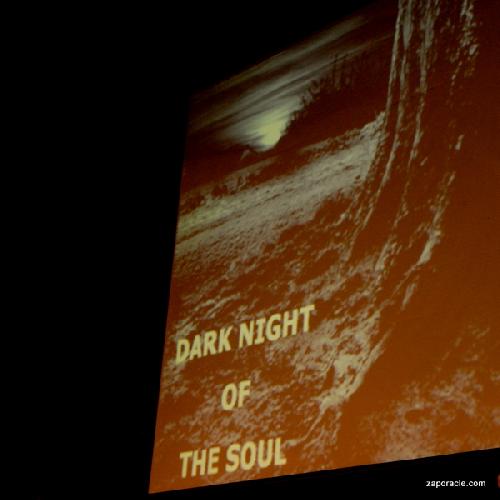Dark Night of the Soul
WATCH THIS CARD AS A YOUTUBE
The dark night of the soul, the descent into destruction, suffering, and chaos may contain the hidden possibility of rebirth. The dark night of the soul can be a zone of intense anguish where meaninglessness ascends and will to live descends. It is also a zone where great transformation is possible. Carl Jung, in his study of alchemy, related the dark night of the soul to the "Nigredo." Nigredo is an alchemical term for a condition of decomposition that was the first step in the transformation of base matter into the philosopher's stone. William James, a renowned Harvard professor considered the father of American psychology, sometimes wrote in his journal, "Please, God, give me a reason to live for the next fifteen minutes." I've had numerous dark nights of the soul. In a couple of the most acute episodes of despair, it felt like I would never be a functional human being again, and suicide might be the only remaining act of self-love possible. In the dark night of the soul, the old identity shatters, and the will to live may collapse. The great potential for metamorphosis in this state is that one lets the false self die, and there is a movement toward the experience of meaning. Only that which is deeply meaningful can bring redemption to the dark night of the soul. Most of my dark nights of the soul were triggered by shocks and great disappointments in romantic relationships. For others, they may be caused by the death of someone close or a spiritual crisis unrelated to specific trigger events. What came in to redeem the dark nights of the soul I've experienced was recognition of duty to others, that there were loving services I could still perform, and that if I could not be loved the way that I wanted, that I could still be love. Worse than the feeling of not being loved can be the loss of someone you love or the feeling that your love isn't wanted and/or there's no one available to share it with. The test I often recommend for separating what is truly valuable from what is false and superficial is to ask yourself: "What will I remember well on my deathbed?" The dark night of the soul is a deathbed for the false self, an invaluable chance to let go of conditioning and return to your essence. In spiritual lore, but also in my own experience, dark nights of the soul are extremely valuable. What is not valuable, though, is depression, which could result from a loss of meaning or might be more physiological in origin. My personal strategy is to allow my psyche to be highly dynamic, so when there is an occasion for tears or a dark night of the soul, I let myself go all the way into it. I favor states of acute anguish over chronic depression. So, if I need to have a dark night of the soul, I never try to self-medicate or get past it with any superficial technique. I embrace it, study it, and let it change me. I want my psyche to have a wide dynamic range between light and dark rather than a medicated baseline. But every empowered person has to be their own physician, psychiatrist, and alchemist, and I don't assume that what works for me will work for everyone. Some people are not having dark nights of the soul so much as mental health crises that may require medical and other forms of intervention. Diagnosis should be a subtractive process where you seek to eliminate possible causes rather than jumping to a conclusion. If there isn't an obvious, powerful trigger event, then first seek to eliminate or identify physical causes, such as sleep disorders, substance abuse, poor diet, etc., before assuming a psychological or spiritual cause. My most acute episodes involved a convergence of physiological, psychological, social, and spiritual causal vectors, and all of those had to be addressed. If the dark night of the soul is happening to someone close to you or that you're responsible for take it seriously, and don't be too quick to think you know the cause. Ask about suicidal ideation. People who talk about suicide, but that you think aren't the type who will actually do it, will do it. I've learned that the hard way. Twice. In one case, the suicidal person presented obvious and prominent psychological, social, and spiritual problems. SheS did not disclose a substance abuse problem and a hugely significant medical condition with potent neurological effects. I did inquire about sleep and diet, but I wish I had known about the other factors, which would have completely changed my counsel. We also need to recognize the limits of our ability to help. Sometimes, we must encourage someone to get help we can't provide. And sometimes we might need outside help too. National Suicide Prevention Lifeline 1-800-273-TALK(8255) Also, we must recognize that some people are determined to self-destruct, and there may be limits to how much anyone can help. If the dark night of the soul is yours, consider this an auspicious time to honor the experience and let it change you. Summon your courage to endure, and your href="http://en.wikipedia.org/wiki/True_Will">True Will can rise phoenix-like from the ashes of despair. See:
Savage Reflections, the Soulful Poetry of Jack Spencer Savage Dealing with Shock Awakening from Depression The dark night of the soul can be hard to grasp in the abstract. All the major characters in my sci-fi epic, Parallel Journeys, undergo transformative dark nights of the soul. Parallel Journeys can be read free on this site. If you prefer Audible, Kindle or physical versions, those are all available on Amazon. My Body is a Cage, a superb music video by Arcade Fire, expresses, at least for me, the transformative darkness of the dark night of the soul. |
||||||||



